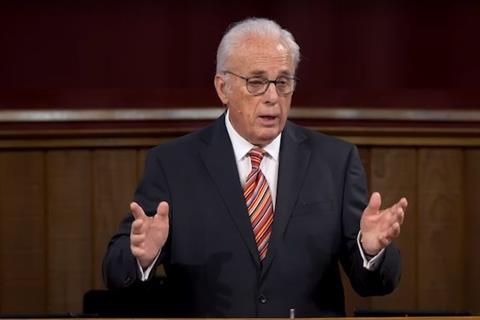The preacher and founder of Grace to You ministries was famous for his unflinching conviction and determination to uphold what he saw as biblical doctrine. John MacArthur’s preaching was well-loved by millions, but the way he expressed his views often caused friction in the global church, says Krish Kandiah

One of the most recognisable and influential American pastors of the last half-century, has died at the age of 86.
John MacArthur was a man of unflinching conviction, fervent theology, and an unstoppable appetite for expository preaching—qualities that won him a loyal following.
For over five decades, MacArthur served as senior pastor of Grace Community Church in Sun Valley, California. His ministry was marked by an unapologetic commitment to the verse-by-verse, expositional preaching of scripture. His “Grace to You” radio ministry and voluminous writings—particularly The MacArthur Study Bible—shaped generations of conservative evangelicals around the world. His preaching style was firm, his interpretation uncompromising, and his message consistent throughout his long ministry.
He once said that as a Christian preacher, “My goal is to offend everyone,” by which he meant he wasn’t afraid to offend his listeners with the challenge of the gospel. As a young Christian I found his stance incredibly compelling. He challenged me to an unflinching commitment to the Lordship of Jesus - a legacy that that continues to impact my life.
There were plenty of controversies throughout MacArthur’s ministry, including his decision to continue in-person indoor services during the Covid-19 pandemic, despite a ban on such gatherings. MacArthur and his church even sued the state of California, and won a $400,000 payout from them. But it was his theological convictions which were most hotly debated among Christians.
An Unyielding Defender of Truth
John MacArthur’s theological hallmark was his commitment to the sufficiency of scripture. He stood firmly against what he saw as theological liberalism, biblical illiteracy, and the “seeker-sensitive” trend that, in his view, diluted the gospel. In an age when many churches sought broader cultural appeal, MacArthur doubled down on expository preaching, reformed doctrine, and a resolute belief in biblical inerrancy.
These convictions were not without value. In my own Christian journey, I’ve seen some of the very dangers MacArthur warned against. There are many parts of the church where we have lost faith in the authority of the Bible and its relevance to every part of life. There is a real temptation to compromise when it comes to allowing scripture in all of its fulness to shape the work and witness of the church. But I’ve also come to realise that the line between faithful discernment and dismissive dogmatism can be perilously thin. Sometimes, instead of engaging other perspectives with humility and grace, the temptation is to write them off entirely.
This raises important questions for all of us. How do we contend for truth while displaying the fruit of the Spirit? How do we discern where to draw theological lines, and when we ourselves might be at risk of the same cultural accommodations we critique in others? For some, MacArthur’s theological rigour went too far. He was often accused of compromising the compassion and openness that Jesus modelled in his ministry.
A strong cessationist
MacArthur was perhaps best known—at least in evangelical circles —for his fierce opposition to the charismatic movement. In his book Strange Fire, he dismissed modern-day expressions of prophecy, healing, and tongues as unbiblical and dangerous. At his 2013 “Strange Fire” conference, he warned of the multitude of dangers of the charismatic movement prompting sharp responses from Christian leaders across the world. While his desire to protect doctrinal purity may have been genuine, his wholesale rejection of charismatic believers—including many in the Global South—felt, to some, like an unnecessary fracture in the body of Christ.
MacArthur was what is known as a cessationist. The key text he would draw on for this view was 1 Corinthians 13:8 “Love never fails. But where there are prophecies, they will cease; where there are tongues, they will be stilled; where there is knowledge, it will pass away. For we know in part and we prophesy in part, but when completeness comes, what is in part disappears.” For MacArthur, completeness has come in the canon of scripture. But for many, like myself, completeness is understood to be achieved at the end of time with the coming of Christ because it is then that we will see Jesus face to face as scripture promises.
While many churches welcome Christians on the full spectrum of cessationist to charismatic, MacArthur called the charismatic movement “a farce and a scam”. By appearing to argue that the movement is a form of abuse and blasphemy against the Holy Spirit, he faced a great deal of criticism and outrage.
A strong complementarian
MacArthur also held strict complementarian views on gender roles, teaching that women should not preach or lead in the church. Most infamously, when asked to respond to American evangelist and Bible teacher, Beth Moore, MacArthur’s terse message was: “Go home.” He went on to say “There is no case that can be made biblically for a woman preacher. Period. Paragraph. End of discussion.”
Such comments, while applauded by his supporters for their clarity, reinforced a patriarchal structure that many evangelical women and younger Christians find untenable, even damaging. His interpretation of scripture may have been rooted in a sincere desire to be faithful—but it failed to acknowledge any alternative interpretation. MacArthur’s combative and abrasive tone won him some supporters but did little to preserve Christian unity or public witness to the love of Christ across doctrinal difference.
In 2022 the Roys Report alleged that MacArthur urged abuse victims to return to abusive husbands or face discipline. Though not criminal charges, the accusations prompted widespread criticism. While the church denied wrongdoing, many saw this as another form of misogyny, and MacArthur became further alienated from egalitarian churches.
His Great Omission?
John MacArthur’s controversial views on social justice became a feature of his later ministry. He said: “This recent (and sudden) detour in quest of “social justice”, I believe… poses such a significant threat to the real message of gospel reconciliation.” In 2018, he co-authored the Statement on Social Justice and the Gospel, arguing that movements for racial reconciliation, gender equality, and other contemporary justice efforts were compromising the gospel’s purity.
The statement, and MacArthur’s vocal commentary surrounding it, sparked widespread debate across the evangelical world—especially in the wake of high-profile incidents like the death of George Floyd. MacArthur contended “The gospel is not a solution to social problems; it is the solution to sin.” Critics, including many within conservative theological circles, argued that this stance reflected a lack of empathy toward real injustices faced by minority communities. Yet MacArthur remained firm in his belief that the church’s primary calling was spiritual, not political or sociological.
Doctine first
John MacArthur was, undeniably, a huge influence on the church in America. His courage to stand firm on doctrine inspired countless pastors and teachers. He saw compromise as the great threat to the church and he led the charge on speaking out against it.
I may take a different stance to MacArthur, but in a spirit of the grace that MacArthur so often talked about, I recognise that in the end, we are all—as MacArthur once said about President Trump—“works in progress.”
May God welcome him with mercy, and may the church take inspiration from his legacy of commitment to the truth of the gospel.






































2 Readers' comments